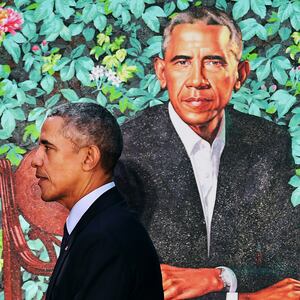If you subscribe to the Mark Twain aphorism that “history doesn’t repeat itself but it often rhymes,” it’s worth noting that Twain didn’t write it and that the Donald Trump presidency doesn’t rhyme with much of anything.
We’ve had hucksters like P.T. Barnum, demagogues like Huey Long, and corrupt politicians like former Illinois governor (and former Apprentice contestant) Rod Blagojevich, but none of those guys got elected president. Richard Nixon was corrupt and did get elected president, but the country turned its back on Nixon when he incriminated himself on his own tape recordings.
The election of Donald Trump—a reality TV host with no previous political experience, who was caught on tape saying when you’re a celebrity you get to grab women by the you-know-what, and won 2.8 million fewer votes than Hillary Clinton—should remove all doubt about the rhyming thing.
Instead of Twain, shouldn’t the patron saint of American historians be political philosopher Weird Al Yankovich, who cautioned America in the ’90s that “everything you know is wrong”? With all due respect to Weird Al, I couldn’t get historians Kevin M. Kruse and Julian E. Zelizer to go quite that far when I talked to them about their book Fault Lines: A History of the United States Since 1974.
In the last 45 years, Democrats and Republicans started sorting by ideology, judicial appointments became partisan battles, Newt Gingrich turned the House of Representatives into a zero-sum political operation, the Electoral College twice—2000 and 2016—failed to award the White House to the candidate with the most votes, and the news media became a collection of hermetic silos preaching to narrowly defined choirs.
“Fault Lines” finds America in a state of polarization that has been mutating and metastasizing since the Watergate scandal and Nixon’s resignation in 1974. That history didn’t make Trump inevitable, but it certainly explains how his election was possible.
Kruse and Zelizer sat down with The Daily Beast to talk about how we got where we are.
The last two presidents have been a mixed-race professor with a Muslim name and an openly racist reality TV host. Are we at a point where history doesn’t offer much guidance for what comes next?
KRUSE: We’re historians. Our training is in hindsight. In a lot of ways, Trump does recall past presidential candidates. George Wallace is somebody who always comes to mind when I watch a Trump rally. You can look at what Pat Buchanan’s run did to the Republican Party as a precursor to Trumpism. What’s happening with social media builds on what happened with the internet and with cable TV before that and with talk radio before that.
We’re off the chart in a lot of ways, but we seem to be coming back to topics we’ve seen before. The question of what to do about the many misdeeds of the Trump administration leads back to the impeachment of Bill Clinton and to Watergate before that. I think it’s useful to use the past examples as a guide for what might come next.
A lot of what’s off the chart comes from Donald Trump.
ZELIZER: Even in the things that seem the most remarkable or unprecedented, we are trying in the book to provide some historical foundation for those changes. How do you have a president who breaks with norms and institutions? There are things that are very unique to him, but we have a lot in the book about how the Tea Party generation of Republicans—like government shutdowns—created room in the party for a president who plays by those rules.
We didn’t write the book to explain President Trump. We finished most of the book before Trump became president to explain the current era, and that context is what historians can add.
Does the change in public opinion on Richard Nixon in 1973 and 1974 tell you much about factionalism or partisanship today, or was that a much different social environment?
KRUSE: If you look at Nixon’s approval ratings, there was a full quarter of the country that still approved of him right through his resignation. There was still 25 percent of the country in his corner even when he left office in disgrace.
There’s a huge chunk of the Republican Party who think Trump will be one of our greatest presidents, and I suppose that’s the same 25 percent who stuck with Nixon.
KRUSE: That’s exactly right. And Trump’s numbers haven’t gone as low as Nixon’s because Trump has something Nixon didn’t have, which is a conservative media ecosystem that dismisses bad stories as fake news, provides counter-narratives, and attacks accusers. Trump said himself that he could shoot someone on Fifth Avenue and people would stick with him.
Newt Gingrich wrote the rules on hyperpartisanship in Congress, but gerrymandering has eliminated any incentive for bipartisanship going forward. Would redistricting in places like Virginia and Pennsylvania correct that?
ZELIZER: The institutional story is hugely important to understanding how partisan polarization works, and gerrymandering is an example of that. Campaign finance is also hugely important; single-issues groups have gained an enormous amount of power since the ’70s to make sure that congressmen stay loyal to particular positions, and the congressional leadership have a lot of money at their disposal to make sure their members stay in line.
There are also individual players, and Newt Gingrich is certainly an important character. The Freedom Caucus that emerges in 2010 introduced a lot of partisan warfare. In the ’70s, it was the Democrats who pushed a more partisan approach to politics. The Republicans, though, have been much more effective at mastering this kind of extreme partisanship.
During the first year of President Obama’s presidency, the Republicans opposed the Recovery Act in the face of the Great Recession, and roughly one-third of the bill was tax cuts. Opposition was their No. 1 priority.
KRUSE: It wasn’t just that one-third of the Recovery Act was tax cuts—it was tax cuts that the Republicans themselves had previously proposed. They were Republican tax cuts. The Democrats grumbled that Obama started out with a compromise bill and would have to compromise further with Republicans, but Republicans wouldn’t even negotiate.
Sen. George Voinovich said that then-Minority Leader Mitch McConnell had decided that Republicans would be against whatever Obama was for. Obama promised a bipartisan presidency, and McConnell shrewdly and cynically realized he could deny Obama any bipartisan success by getting Republicans to oppose their own ideas. And it worked.
ZELIZER: The parties were in very different places by the 2000s. Obama believed in the possibility of bipartisanship. He became famous for the speech in 2004 about there being no red states and blue states, he adopted Republican policy ideas, and he was persistent about trying to win the support of Republicans.
Do you see any hope for a grand bargain on immigration where we get a strong border bill and naturalization for most of the people who are already here?
ZELIZER: In 2013, a grand compromise on immigration would have meant a path to citizenship for the 11 million people who are here, but the Republican Party had already shifted to a point where that was not possible. Today, it would be a long haul to get Republicans to agree to even limited cases of naturalization because we’ve moved so far to the right from where we were in the Obama years.
It would seem to make some difference that the House is now in Democratic control and that there are at least some Republicans in the Senate who would benefit from a compromise on immigration.
ZELIZER: George W. Bush tried on immigration reform. Obama tried it. President Trump has been so extreme a figure and brought out an extreme element in Republican politics. Lindsey Graham has moved to the right on immigration. It’s not clear where Marco Rubio is at this point. It matters that House Democrats have power, but there aren’t a lot of Republicans who want to do business with them.
You both communicate on platforms—Zelizer on CNN and Kruse on Twitter—that are newer than the traditional books and lectures of academia. Do you see that happening in other academic disciplines?
KRUSE: We both hear from a lot of other academics that they’re happy about the fact that we’re on these platforms. If it weren’t us, it would just as likely be someone who’s not a historian on those platforms and getting it wrong. On Twitter where I am, there are a lot of academics using the platform to meet people where they are to correct the record when there are mistakes and also to provide some perspective.
ZELIZER: You see academics like [Evicted author] Matthew Desmond in sociology doing great work on the economy that has reached well beyond the academy. There are a lot of political scientists like Theda Skocpol who are very devoted to public discourse.
I see some historians who disappear in the archives for five years to write a biography of an obscure governor and others who are much more involved in explaining history. Are you both firmly in the latter group?
ZELIZER: We’re in both worlds, and that’s really important for both of us. We go to the archives, we write traditional history books, and we both spend a lot of time reading and teaching. We want to understand what other scholars and what journalists are writing. With Fault Lines, we’re pulling together the work of a lot of great historians to try and tell a bigger story. At the same time, we have a very public presence to provide context on what’s happening.
One of you in particular enjoys fighting with Dinesh D’Souza on Twitter.
KRUSE: I don’t like bullies. I like exposing frauds. It gets tiresome when my mentions are flooded with trolls, but I’d say it’s enjoyable on the balance. Other people apparently enjoy it too because my follower count shot up when I started taking him on.






